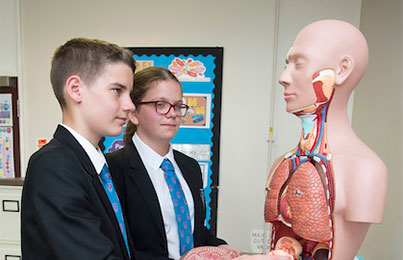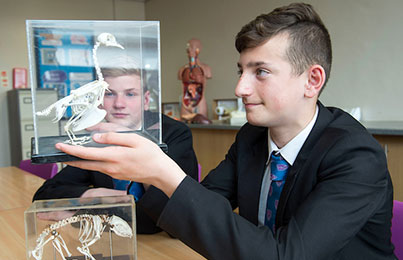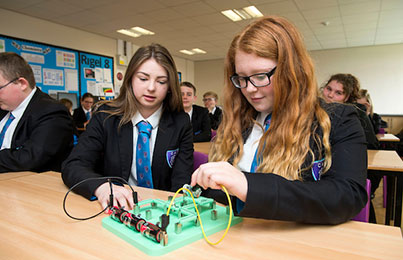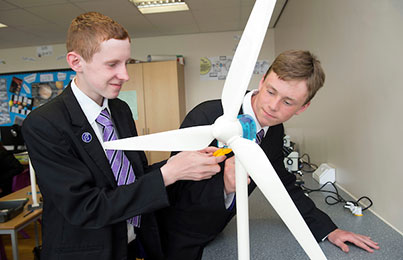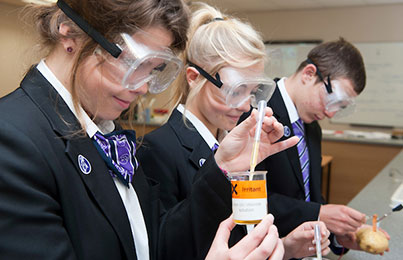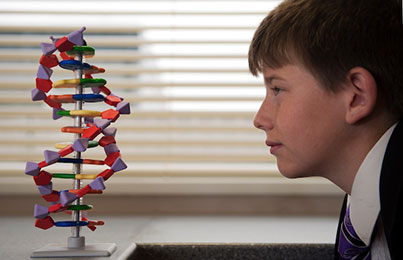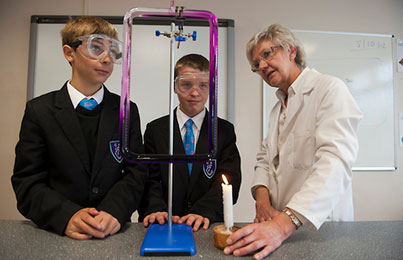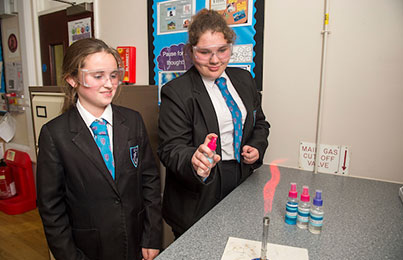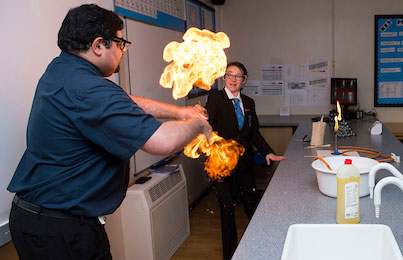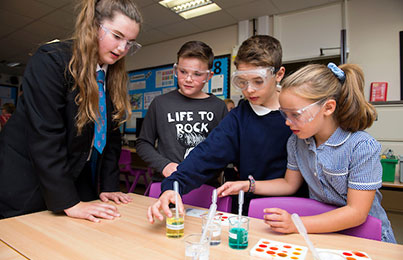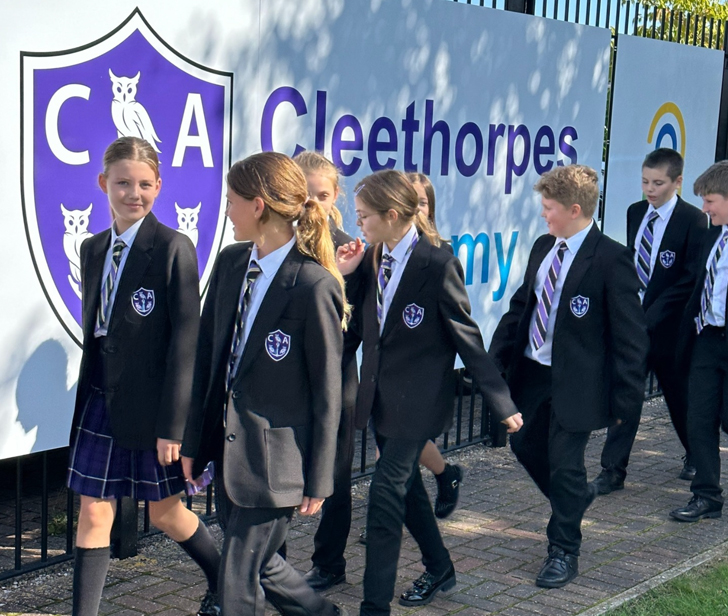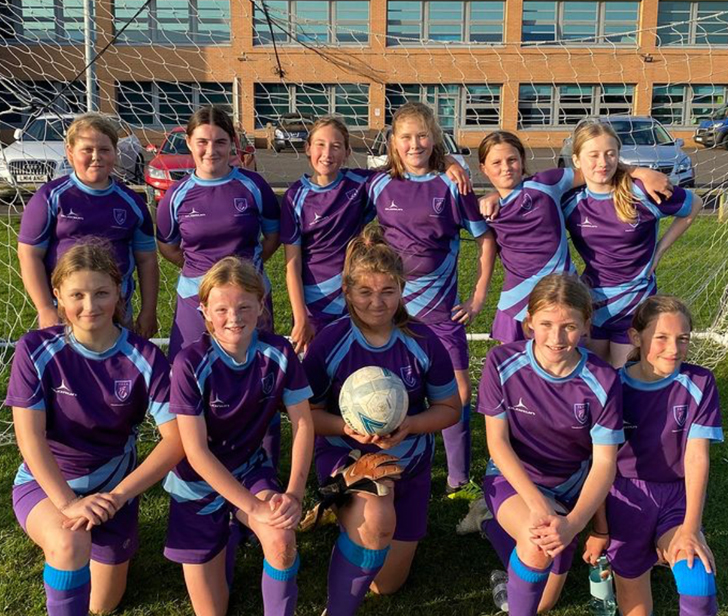Science
- Science
- Ethos & Values
- Knowledge & Skills
- Resources & Facilities
- Courses & Qualifications
- GCSE, Additional & Combined Science
- Learning Outside The Classroom
- Where Does This Take Me In The Future?
Science
Science is a thriving and popular subject in school with students engaging in a variety of practical and physical experiments to support traditional teaching methods. Science students are taught Chemistry, Biology and Physics within the science department.
We aim to ensure science students understand the theory, history and contemporary context of the subject. Science is a fascinating subject, relevant to every student to enable them to understand themselves and the world around them. We aim for our students to develop a genuine passion for science which not only helps their learning but enhances their enjoyment of the subject.
Science teaches students to ask why, and answer how, through the stunning breakthroughs and innovations that continue to drive the subject forwards. Scientists research, experiment, discuss and develop arguments through exploring complex theories and evaluating outcomes in a systematic and analytical way. It is a creative and innovative subject that, contrary to popular belief, is driven as much by dreams and imagination as it is by evaluation and measured response. Students develop in science across the key stages and are able to think independently, reason, solve problems and assess risk.
Ethos & Values
As a curriculum area, our primary teaching aims are:
- To produce not only well-qualified scientists, but also young people who can use their knowledge, understanding, application and skills throughout adult life.
- To enable students to experience an exciting and creative climate for learning science regardless of key stage and ability.
- To maintain the Science Curriculum Area at the leading edge of educational innovation.
- To reinforce the links the Science Curriculum Area has with partner educational institutions and the local and wider community.
- To raise the overall standard of teaching and learning in Science.
- To maintain a philosophy of continuous improvement in every aspect of the Science Curriculum Area.
- To support Academy and National strategies in literacy, numeracy, enterprise and the use of ICT within the context of Science.
Knowledge & Skills
The aims of these qualifications are to encourage students to:
- acquire a systematic body of scientific knowledge, and the skills needed to apply this in new and changing situations in a range of domestic, industrial and environmental contexts;
- acquire an understanding of scientific ideas, how they develop, the factors which may affect their development and their power and limitations;
- plan and carry out investigative tasks, considering and evaluating critically their own data and that obtained from other sources, and using ICT where appropriate;
- use electronic (internet, CD ROMs, databases, simulations, etc.) and/or more traditional sources or information (books, magazines, leaflets, etc.) to research and plan an investigation;
- select, organise and present information clearly and logically, using appropriate scientific terms and conventions, and using ICT where appropriate;
- interpret and evaluate scientific data from a variety of sources.
Resources & Facilities
The Science laboratories have undergone refurbishment and are well equipped, modern and attractive Lessons are purposeful and enjoyable. Experienced staff help students to understand concepts using diagrams, photographs, video clips, calculations, explanations, demonstrations and practical work. There are lots of opportunities to ask questions, clarify ideas and discuss concepts in lessons.
There are 7 teaching laboratories all of which have interactive white boards and access to a comprehensive suite of software including 5 computers. There is also 1 ICT Science site for the exclusive use of the department. In addition there are 2 very well-resourced preparation areas and a staff work-area.
Courses & Qualifications
At Key Stage Three Science taught separately as Biology, Chemistry and Physics by subject specialists in Years 7, 8 and 9. In KS3 students study cells, human anatomy, reproduction, particles, elements, atoms and compounds, acids and alkalis, forces, waves, light and space, health and lifestyle, ecosystems, adaptation and inheritance, the periodic table, separation techniques, metals and acids, the Earth, electricity and magnetism, energy, motion and pressure.
At Key Stage Four students follow the GCSE Twenty First Century Combined Science course.
GCSE Combined Science covers content from all three separate Sciences; Biology, Chemistry and Physics. The new GCSEs will also require students to carry out sixteen practical activities. Practical activities are embedded throughout the teaching topics. The development of practical skills is a fundamental and integral part of study of any scientific subject and will help students throughout their course in preparation for the written examination.
Biology content includes, genetics, keeping healthy, food, ecosystems, using food, controlling growth, the human body, life on Earth. Chemistry content includes, air and water, chemical patterns, chemicals of the natural environment, material properties, chemical analysis and making useful chemicals. Physics content includes, radiation and waves, sustainable energy, electricity, motion, radioactive materials and matter.
GCSE Science, Additional Science & Combined Science
Science is a core subject in the national Curriculum and as such must be studied by all to the age of 16. A broad and balanced GCSE Science curriculum can be followed at Cleethorpes Academy in Years 9, 10 and 11. Currently Year 11 are using the OCR Twenty First Century Science and Additional Science. Years 9 and 10 are following the OCR Twenty First Century Combined Science. The Science Faculty comprises a full complement of specialist science teachers experienced in the teaching of Science GCSE courses.
All of us, as citizens, need to be able to cope with the science that shapes our lives. We are on the receiving end of scientific ideas and technical information in many different roles such as worker, householder, parent, patient, voter or juror.
Some young people aspire to be scientists, or to work in careers where knowledge of science is essential. So educating the next generation of science practitioners is also crucial.
How many GCSE grades will students get?
A student taking just GCSE Science will be awarded one GCSE grade for Science. A student taking Additional Science will be awarded one grade for GCSE Additional Science. Because the assessment of the courses are independent, these two grades may be different. A student taking GCSE Combined Sciences will be awarded 2 GCSEs levels 9-1. The 2 levels may be different.
GCSE Science has an emphasis on scientific literacy - the knowledge and understanding which students need to engage as informed citizens with science-based issues. It features many of the major theories of science in a way that encourages students to appreciate their importance to everyday life. The course also explores how scientific information is obtained, how reliable it is, what its limitations are, and how this information helps society to make important decisions. Students are prepared to deal with issues involving science which they may meet, for example, mobile phone safety, decisions about childhood vaccinations, and sustainable use of resources.
GCSE Additional Science is a concept-led course developed to meet the needs of candidates seeking a deeper understanding of basic scientific ideas. The course focuses on scientific explanations and models, and gives candidates an insight into how scientists develop scientific understanding of ourselves and the world we inhabit.
This specification, together with GCSE Science, aims to provide candidates with the scientific understanding needed to progress to further studies of science, should they choose to undertake them. Candidates should gain a deeper understanding of:
- Scientific explanations and models
- How these concepts can be applied to the benefit of humanity
- How scientists help to develop our understanding of ourselves and the world we inhabit.
Our concept-led course focuses on scientific explanations and models. It explores scientific concepts in more depth, and develops students' understanding of how scientists work. It is appropriate for students who may wish to progress to IB, both standard and higher levels, or wish to follow a science based career.
They draw on the teaching modules from the GCSE Science with a further section of content specific for each subject.
Coursework
GCSE Science - Controlled Assessment (25%)
GCSE Additional Science - Controlled Assessment (25%)
Examinations
GCSE Science - 3 Science exams, (25% each)
GCSE Additional Science - 3 Science exams, (25% each)
GCSE Combined Science has an emphasis on scientific literacy - the knowledge and understanding which students need to engage as informed citizens with science-based issues. It features many of the major theories of science in a way that encourages students to appreciate their importance to everyday life. The course also explores how scientific information is obtained, how reliable it is, what its limitations are, and how this information helps society to make important decisions.
The new GCSE also develops students' ability to plan and carry out scientific investigations and their understanding of the role of experimental work in developing scientific explanations.
Examinations
GCSE Combined Science – 4 exams, (Biology, Chemistry and Physics 26.4% each + Practical Skills Combined Science 20.8%)
Learning Outside The Classroom
Academic and extracurricular enrichment underpin all aspects of Science. After school Science clubs are run for KS3 through the year.
Year 5 and 6 taster days enhance the learning experience of the younger students whilst providing our gifted and talented students the chance to work independently. Successful competitions are run with guidance from the Science department and a selection of Gifted and Talented students.
Students are supported in their studies through additional consolidation and revision classes, and one to one tutorial support. Individual guidance is also on hand from our learning support staff.
Coursework Catch Up
During the year students are invited to attend coursework catch-up sessions whenever necessary as well as for students to build on and improve their coursework. These sessions take place after school, at weekends and during half term. Students can come in and do their work in a relaxed atmosphere with more one to one help from the staff.
Science Club
A recent addition to the roster of School Clubs, Science club has had an excellent start. Primarily aimed at KS3 students we have had an outstanding response from these year groups with a high level of attendance.
Running after school on a Thursday, students have been performing experiments designed to complement what they have been learning throughout the year. The focus of the club is to be engaging and hands on and demonstrating to the students that Science is fun.
So far this year student have been exploring the principles of Rocketry which is designed to complement the physics modules taught at KS3, The effects of enzymes and catalysts to speed up intense reactions.
Throughout the rest of the year we will be continuing to look at the chemical and physical aspects of rocketry and space, applications of forensic techniques to solve crimes and a whole host of exciting, fun and interesting science.
Where Does This Take Me In The Future?
- Provides opportunities for students who may wish to be employed in the science industry or organisations that use science, to develop knowledge and skills in specific sciences.
- Provides a good progression route to more advanced qualifications.
We have had several students apply for apprenticeships with multi-national companies such as Novartis and the National Grid. All of us, as citizens, need to be able to cope with the science that shapes our lives. We are on the receiving end of scientific ideas and technical information in many different roles such as worker, householder, parent, patient, voter or juror.
Some young people aspire to be scientists, or to work in careers where knowledge of science is essential. So educating the next generations of science practitioners is also crucial.


